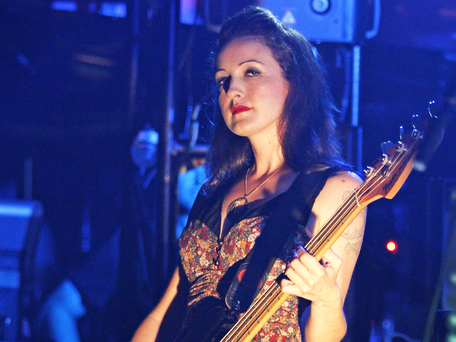
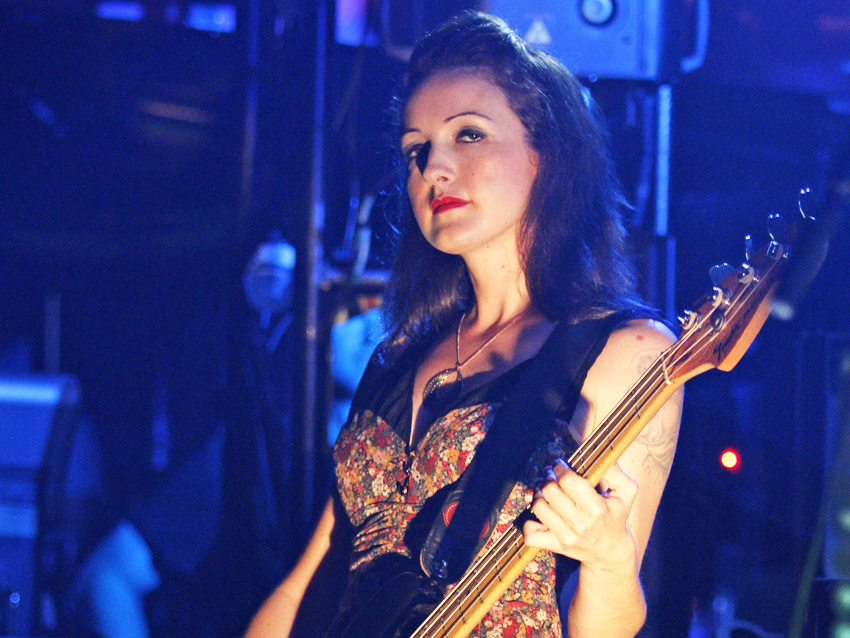
Bassist Nicole Fiorentino brings a sophisticated and melodic touch to The Smashing Pumpkins' new sound. © Sayre Berman/Corbis
"I don't feel strange playing with bunch of guys," says Smashing Pumpkins bassist Nicole Fiorentino. "I'm pretty well adjusted to it at this point, and they know they can say anything around me and it's OK. If anything, I can be just as bad as them, so we're all equal there."
Equal, yes, but there is one advantage to being the sole female in a mostly male band that Fiorentino down own up to: "When we're at an airport and I'm dragging my luggage, I'm the one person that people will come to help," she says with a laugh. "The guys will look at me like, 'Oh. Must be nice being the girl!'" Any other time, I'm treated just the same, but the perks in the airport, hey, I'll take 'em."
Since joining The Smashing Pumpkins in 2010 and completing the lineup that now includes founder and frontman Billy Corgan, drummer Mike Byrne and guitarist Jeff Schroeder, Fiorentino, a veteran of such bands as Veruca Salta Spinnerette, among others, has quickly established herself as a key force in making the new lineup a dazzling musical ensemble, and her contributions - she's a quirky, assured and wildly alive player - have helped to make the group's just-released album, Oceania, the most daringly original, heartfelt and, at times, unconventional set to come from the band in over 15 years.
Before heading off on an Australian tour, Fiorentino sat down with MusicRadar to talk about the recording of Oceania, her approach to the bass, why she's become a new fan of Fender Jazz Basses and her thoughts on the current lineup of The Smashing Pumpkins, a group she says are here to stay.
What made you gravitate towards the bass? It's not the first choice for guys, let alone girls.
"When I was a kid, I tried every instrument known to man. My dad was a musician, so there were always instruments lying around the house. He was primarily a drummer, so I think his dream for me was to be on the drums. I couldn't really get the hand-foot coordination down, though, which was surprising because I was a dancer. What can I say? I didn't get the drummer gene. [laughs]
Want all the hottest music and gear news, reviews, deals, features and more, direct to your inbox? Sign up here.
"For a while, I fiddled around with different instruments, but when I was 14, my dad bought me a bass and I instantly connected with it. There was something about the bass… it was the mysterious instrument on stage. I still think it is.
"I approach it in a melodic was, as opposed to just being a 'root note' person. I think that's what attracted Billy to my style. He always tells me I'm like a Geddy Lee-type player or a Peter Hook kind of player. I've just always thought melodically. But I never had the desire to be the front person or lead singer; I'm cool with hanging back and doing my thing, singing background vocals. That's good enough for me."
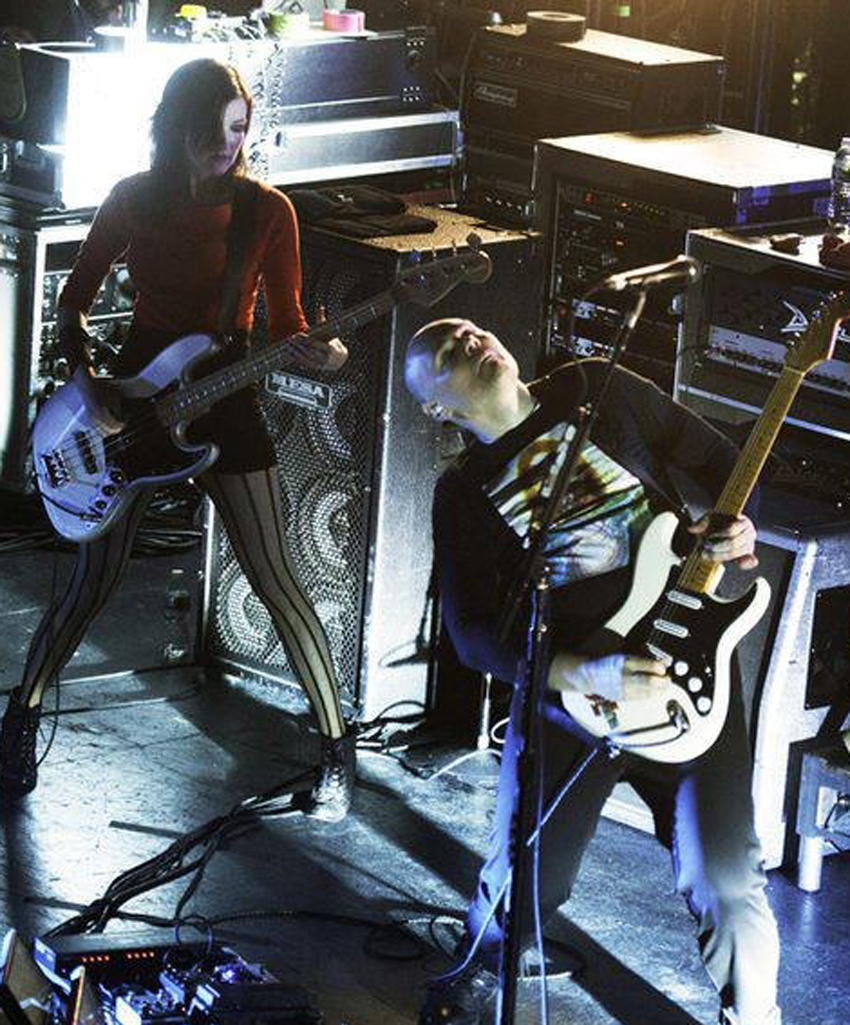
Fiorentino says Billy Corgan has given her "a lot of freedom, which is something I don't think he's done with bass players."
Your style is melodic, yet it's very aggressive, as well. Who were you listening to during what we would call your "formative years"?
"I was listening to a lot of Nirvana, Hole, PJ Harvey, Sonic Youth, Pixies, obviously the Pumpkins." [laughs]
So, by and large, it was pretty impactful music.
"Yeah, it was pretty aggressive. And at that time I was getting into Riot Grrrl and all those things, so there was a bit of 'I am woman, hear me roar.' [laughs] It was a mental thing, too.
"Beyond the formative years, I think I've become more of an aggressive player since joining the Pumpkins. You know, on the majority of the records, Billy played bass, and he has such a heavy hand, so I've had to kind of blend my style with his to play those older songs well. But I've definitely brought my own style to it."
When you joined the band, what was the agenda? You got in the group after Teargarden had started, but Oceania wasn't yet on the horizon.
"Billy wasn't looking for a hired gun. He wanted a musical partner. When I joined, he was very straightforward in saying that to me. He basically said, 'I see your style, I've seen you play live, we've jammed together - I think you'd be a good fit.' He's very psychic and intuitive, and he bases a lot of his decisions on intuition alone. He felt that we had a psychic and musical connection, and he wanted to see where it could go. So the agenda simply became 'Let's start working on this record together.'
"He gave me a lot of freedom, which is something I don't think he's done with bass players. In the past, he's played on all the records. But with me, he was very open with whatever I was going to bring to the table. We started working on the Oceania songs, and that took up pretty much all of last year. Now we're gearing up to start touring on the record, which is going to be really exciting. It's very rewarding to get up there and play my own parts. It's cool to play the old songs, too, and have that blend, but doing the new stuff is so rewarding."
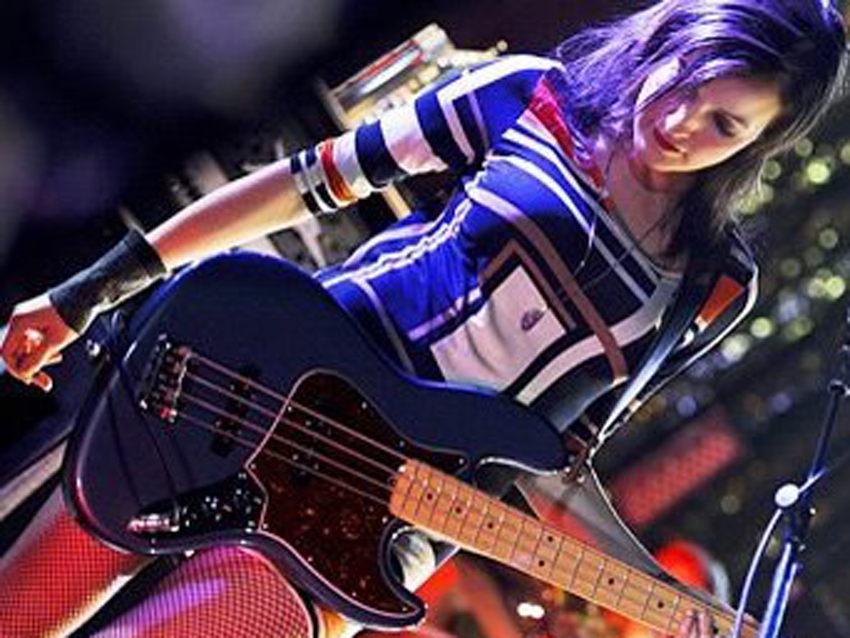
"I've amazed myself how much I've brought to the table and helped shape some of these songs," says Fiorentino.
You were the last one to join this lineup. How long did it take for you to feel as though the band had truly gelled? Do you remember when you said to yourself, "We are a band"?
"Honestly, it didn't take that long because I had been working with Billy a little bit by myself before I started playing with the band. From what the boys tell me, they felt like the unit really came together when I joined. For me, it all felt very natural within the first few weeks of my rehearsing with them. Even before I was officially told I was in the band, we had been acting like a band. The whole thing just fell into place."
Billy plots out a lot of his songs pretty methodically, but he told me that some of the cuts on Oceania started spontaneously in the studio.
"There were a few times when that happened. I know Glissandra was one of those songs. I remember Billy started playing and I was like, 'Ooh! What was that? What was that?' [laughs] He said, 'Oh, I don't know. It's just something I was playing this morning in my house.' I was like, 'Keep going with that.' I played a little bit of a bass groove, and then he said, 'OK, do that, but leave a little bit of space in this part.' And that's how we work together. I'll come up with my initial idea and we'll tweak it together."
He also told me that on One Diamond, One Heart, he pushed you to come up with a bass part that would really make the song click. Pressure?
"Yeah, a little bit! [laughs] We were in the studio listening to the song in the engineering room, and Billy looked at me and said, 'It needs a little flair. It just needs something, and I feel like it's going to come from you.' So he asked me to take 20 minutes - 20 minutes, no problem; I'll just whip it out, you know? [laughs] - and he'd peek his head back in to see what I had.
"But you know, he is that kind of person, somebody who pushes me to my fullest potential. I've never had that in my whole life. Throughout this process, I've amazed myself how much I've brought to the table and helped shape some of these songs. And it's a real sound - very organic, clearly 'a band.' It's not just Billy.
"As for what I did on that song, I threw in these sparse, melodic lines. I found moments where it needed a little push and I went with my intuition. I think that's why Billy and I get along so well. He heard what I did and thought it worked."
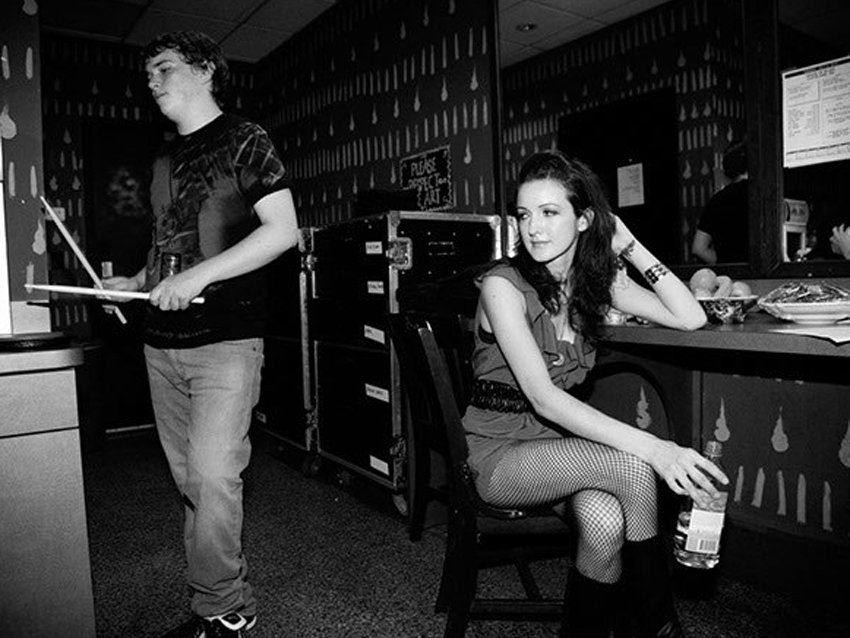
With drummer Mike Byne back stage. "Mike and I actually work on harmonies a lot together," Fiorentino says. © Kristin Burns
Your singing on Pale Horse is lovely. How much do you and Billy actually work on vocal harmonies?
"Mike and I actually work on harmonies a lot together. We were working in this big studio, so there was something going on in every room at any given time. Mike and I would be in one room doing harmonies while Billy was doing a guitar part, or Jeff would be in another room doing a different guitar part. Everybody was really busy.
"Billy just kind of left us alone to figure things out. He'd peek his head in and say, 'Why don't you try this in this part?' But Mike and I did a lot of parts on our own. Pale Horse just kind of fell out of us. It was probably one of the easiest."
Billy was apprehensive about putting a couple of songs on the album because they sounded a little too much like the 'classic' Pumpkins. Now, obviously he personalizes this in a way that's unique to him. You, however, weren't in that lineup, so what were your feelings about those songs?
"When we listened to the songs back to back, they felt like such a journey, so it became difficult at that point to say, 'OK, pull this one.' It's like tearing a chapter out of a book. Personally, I encouraged Billy to keep the songs, that they were essential to the record as a whole. Inkless I felt very strongly about. I pushed for that 150 percent. I was like, 'You're not taking away my song!'" [laughs]
But I get where Billy is coming from with those songs - he doesn't want to "go back" to his old sound, in so many words. On the other hand, he owns that sound. It's his. He invented it.
"That's his sound, and I feel like he was able to bring it back on this record, what is personally his and what he does so well. And then we sort of brought a new fresh edge to that. I don't think that it sounds like his old songs; it sounds like, 'OK, this is Billy Corgan.' [laughs] He's doing his thing again."
What's the biggest musical lesson you've learned from Billy so far - or from any of the other band members?
"To simply trust myself and follow my instincts. And don't take the easy way out. Never get to the point where you think, That's good enough. The majority of the songs on the record went through so many transformations, but it was worth it because they're now in the form that they're supposed to be. It took a lot to get them there, but that's OK because we're workhorses."
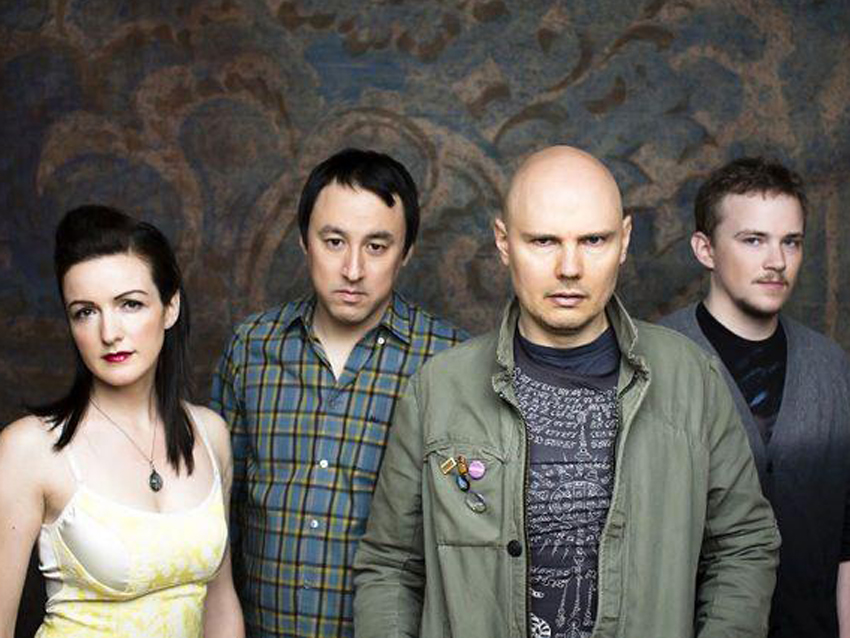
"We're workhorses," says Fiorentino with fellow Pumpkins Jeff Schroeder, Corgan and Byrne.
It's no secret that there's been drama in the band throughout the years, but it certainly seems as though you're a happy lot now. Billy comes off as being very happy.
"It's the best time, I think. We're all in the same headspace and have the same goals, and we're figuring out how to get to where we want together. This record is proof of that. The feedback we're getting from the fans is so positive; they're so supportive of the new lineup. That's helped a lot. The obsession with the old lineup has been going away; people are letting go of that. You can feel it. We're a band. We're not going anywhere. [laughs] Get used to it!"
Let's talk about your basses and gear. You tend to favor Fender Precision Basses, right?
"Yeah, but on this record I was messing around a lot with some of the Jazz Basses that Billy had in the studio. There was one in particular, a '63 Jazz, and I probably recorded 75 percent of the record with that bass. I just fell in love with it.
"It works with my style better. I play high up on the neck a lot, and for whatever reason, the Jazz Bass has a warmer tone versus the Precision, which for the way I play is a little clankier. I was playing the P-Basses on some of the older songs, but now in rehearsals I'm playing only the Jazz Basses, which is what I'm going to bring to Australia - only Jazz Basses."
What's your live setup going to consist of in terms of amps and effects?
"In the studio, I used a Reeves 400. I had those, my Mesa Big Block Titan head and a Mesa 8 x 10 cab. That'll be my live setup, too. As for effects, I'm playing with an Electro-Harmonix Neo-Clone chorus, a Bass Microsynth - that's Electro-Harmonix, as well - and a pedal called a [Subdecay] Baby Quasar. Funnily enough, I use it on the song Quasar. [laughs] I think that's it. I'm pretty sparse, but I do use a compressor for most of the songs."
Is there an area of your playing that you want to improve? Something about your style that frustrates you and you want to work on?
"Hmm… that's a good question. I think playing the really, really heavy rock stuff is something I want to work on. I've gotten better over the years, but as I said before, Billy has a super-heavy hand, so I have to dig in - play in that style but not imitate. I'm working on a blend. It was a challenge for me at first, but I'm getting there."
Joe is a freelance journalist who has, over the past few decades, interviewed hundreds of guitarists for Guitar World, Guitar Player, MusicRadar and Classic Rock. He is also a former editor of Guitar World, contributing writer for Guitar Aficionado and VP of A&R for Island Records. He’s an enthusiastic guitarist, but he’s nowhere near the likes of the people he interviews. Surprisingly, his skills are more suited to the drums. If you need a drummer for your Beatles tribute band, look him up.
